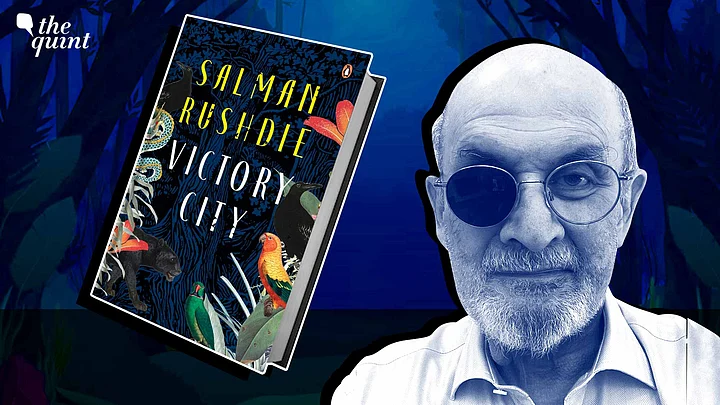Salman Rushdie’s Victory City is more than a novel.
It is a life-affirming totem. It is the triumph of the storyteller: Rushdie himself and all others who have defied or succumbed to death to serve the cause of storytelling.
Victory City has come with a chip on its shoulder—Rushdie’s first novel after a near-fatal stabbing in a New York event. It will be an arduous task to delink the symbolism of publishing this novel from its literary merit. The book, let this be recorded, stands tall as one of Rushdie’s finest works.
The Plot of Victory City: Is Salman Rushdie Being Modest?
The story of Victory City is quintessentially Rushdiesque—of the rise and fall of empires, families, and demigods. Rushdie is inarguably the Homer, the Valmiki, the Vyas of our times, bringing worlds alive through his words. There is a creator-writer Pampa Kampana whom Rushdie lends his mantle for plot purposes.
The empire of ‘Bisnaga’—a corruption of Vijaynagar is willed into existence by Pampa Kampana, “a vessel for Goddess Parvati” through two brothers Hukka and Bukka. The story of this empire’s rise and fall is what occupies the space of 340 pages—it starts with a funeral pyre and ends with one, too. Pampa Kampana survives both for she is the muse, the mother, the poet, the prophet whose account of the empire’s ‘life’ and ‘death’ called ‘Jayaparajaya’ has been “retold in plainer language by the present author, who is neither a scholar, nor a poet but merely a spinner of yarns."
Salman Rushdie's Meta World
Rushdie’s Victory City, thus, becomes a stellar example of his tried and tested literary genre of what Jean-François Lyotard calls ‘metanarrative’, and draws attention to the very process of authoring the novel, thereby, turning it into a ‘metafiction’. But the ‘meta’-ness of the work spreads beyond what the author claims to be doing and encourages the reader to become a participant in the world of Rushdie’s words.
Who can after all, not think about Rushdie’s own travails while reading about the fate of poets and prophets in the book? What befell Pampa Kampana is eerily identical to the recent attack on Rushdie. Or, who wouldn’t chuckle about the Hobbesian reflection of Bukka, “Looks like even the magic seeds have one rule for the rulers and another for the ruled” early on in the story? Further, “‘The day will come,’ Bukka said mutinously ‘when we will no longer allow foreigners to tell us who we are.’”
Rushdie has deftly sprinkled references to philosophical debates and current affairs throughout the book which increasingly appears to be a fable of and for our times. During Pampa Kampana’s exile in the forest, the ilk of Vidyasagar is eager to change the names of streets of Bisnaga and the “city was now under this new senate’s strict religious control, as it 'demolished' the philosophies of Buddhists and Jains as well as Muslims to celebrate the New Orthodoxy."
Remember, Rushdie has been critiquing religious orthodoxies of all stripes. His criticism of the rise of the Hindu supremacists lost him many a fan in India who earlier hailed him for resisting Islamist supremacist ideas.
All About Here and Now
Past, present, and future have always coexisted in a fabulist harmony in Rushdie’s fiction. Victory City, therefore, is no exception. While the unnamed narrator’s ‘translation’ of Pampa Kampala’s epic poem moves in a linear fashion, the reader is sucked into the vortex of the 'here and now'.
Pampa Kampana, like Ursula in Gabriel Garcia Marquez’s One Hundred Years of Solitude, is witness to the rise and fall of generations in Bisnaga. Her dealings with the Portuguese and the Chinese and many other “foreigners” make Bisnaga the empire that it was. Rushdie’s oh-so-obvious celebration of multiculturalism in the book is like a familiar meme doing rounds on the internet.
The reason is simple: his literary politics is defined by the realpolitik of his mother and the adopted countries. Since the resistance towards the ‘other’ has reached caricaturish levels in these countries, Rushdie won’t leave it alone in peace. He must insert lines such as these to define an ideal state:
“Every man may come and go and live according to his own creed. Great equity and justice is observed to all, not only by the rulers, but by the people, one to another."
The Joke
Pampa Kampana’s ideal city, however, is a short-lived one. After all, “it is a kind of derangement in the world when a mere accusation supported by nothing feels like a guilty verdict” and this great derangement can only end in the fall of structures—State, relationships, society et al—it ostensibly tries to protect.
And with the finale, the real Rushdie reveals himself. Forever irreverent, pulling elaborate literary pranks, almost smirking at his readers' naïveté.
The last lines of Victory City are also a historiographer's delight:
“…How are they remembered now, these kings, these queens?
They exist now only in words.
While they lived, they were victors, or vanquished, or both.
Now they are neither
.…
They will be remembered in the way I have chosen to remember them.
…
They will mean what I wish them to mean.
…
Words are the only victors…”
All myths of origin are suspect, and those who believe them to be the Truth—including the readers of Victory City—are nothing but naive, to put it mildly.
